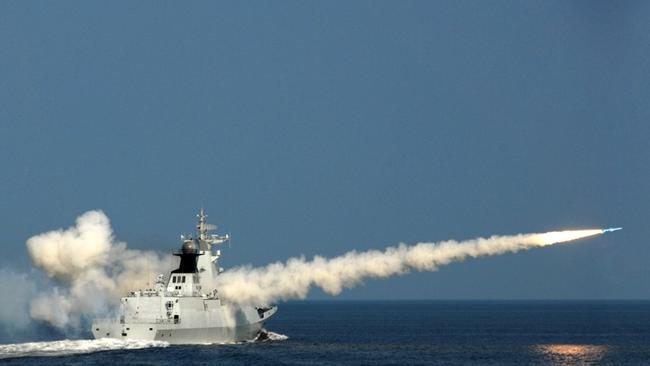Reports China’s ambassador warns Japan of consequences for South China Sea dispute
CHINA has staged “war-games” in the Sea of Japan — simulating a bomber attack on a warships — as Tokyo reveals it has been warned not to cross a “red line”.
CHINA has staged ‘war-games’ in the Sea of Japan — simulating a bomber attack on a naval task force — as Tokyo reveals it has been warned not to cross a ‘red line’ in the South China Sea.
The Kyodo news agency is reporting diplomatic sources as telling it that Beijing’s top ambassador in Tokyo has warned Japan it should not take part in US-led ‘freedom of navigation’ exercises in the contentious waterway. If Japan did so, the diplomats reportedly told Koyodo that ambassador Cheng Yonghua had asserted China would ‘not hesitate’ in taking military action.
“(China) will not concede on sovereignty issues and is not afraid of military provocations,” Cheng is reported to have told Japanese officials late in June.
#China’s #PLA air force and navy on Sat conduct maritime confrontation drill near waters of the Sea of #Japan pic.twitter.com/QAynxvwe74
— People's Daily,China (@PDChina) August 20, 2016
Japan’s interests in the South China Sea are mainly strategic. It has no claim to any of the contested islands, but a significant proportion of the nation’s exports and imports — particularly fuel — pass through international shipping lanes there.
Tokyo, however, does have a dispute involving the Senkaku/Diaoyus islands in the East China Sea. Just last week a large Chinese fishing fleet, escorted by up to 14 armed coast guard vessels, entered waters Japan considers to be part of its exclusive economic zone.

MESSAGE IN A BATTLE?
The Chinese war-games, which reportedly took place Saturday morning Australian time, pitted ‘red and blue’ forces against each other in an engagement centred about two naval task groups.
The People’s Liberation Army issued a statement saying its radar early warning aircraft (AWACS) had located and directed bomber aircraft to engage the fleet in a ‘radically short time.
“This deep sea exercise is part of annual training arrangements, is not aimed at any specific country, region or target, and accords with international law and practice,” a statement from the People’s Liberation Army Daily reads.
Bomber aircrafts from the East Sea Fleet of #China’s #PLA Navy held combat drill in int'l waters in the Sea of Japan pic.twitter.com/TBFU3K4dzp
— People's Daily,China (@PDChina) August 21, 2016
EXPLORE MORE: War games explore China conflict
DELVE DEEPER: ‘You will suffer more’, Beijing vows
Footage shown on official Chinese media shows H-6K nuclear-capable bombers said to be taking part in the exercise. This aircraft, a modern version of a 1950s Russian design, has been increasingly put on display in recent weeks.
The exercise may also have been a demonstration of the fighting prowess of its latest warships, the Type 054A stealth frigate Jingzhou and its Type 052C destroyer Xi’an. These ships had just completed joint exercises with US and other Pacific nations in the RIMPAC multinational event.
China will conduct joint naval military exercises with Russian ships in the South China Sea next month.

INTENSE RIVALRY
Tensions in the South China Sea have been rising steadily since Beijing began construction of its ‘great wall of sand’ — a string of artificial islands strategically placed to claim sovereignty over almost the entire strategic waterway.
In recent weeks satellite photos have provided further evidence of the intended militarisation of these facilities. Military grade hangars capable of holding more than 70 aircraft have been spotted under construction in the Spratley Islands.
China will work unswervingly to gain control over the South China Sea, says Jonathan Holslag https://t.co/HXV8DzeLXw pic.twitter.com/Oa6r39oFbP
— SCMP News (@SCMP_News) August 21, 2016
The United States has been attempting to assert its military dominance over the region, sending warships and planes on ‘freedom of navigation’ missions into waters and airspace now claimed by Beijing to be its own.
An international court of arbitration ruling that China’s claim to the waterway earlier last month has resulted in a significant escalation of military posturing in the region.
Japanese participation in military exercises with the US, Australia and other regional nations has drawn the wrath of Beijing which has repeatedly warned the World War II aggressor to keep out of the region’s affairs.



